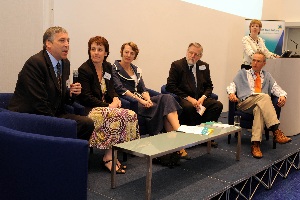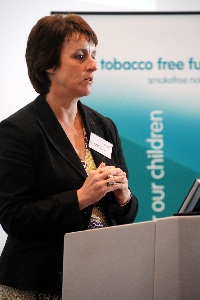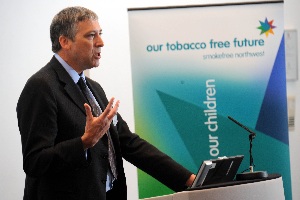|
North West people say:- “Let’s make smoking history for our
children”

HEALTH experts
and community leaders heard that North West residents
overwhelmingly support further measures to protect children from
tobacco. Findings from research carried out by Smokefree North
West were revealed at the regional launch of a new consultation on
the National Tobacco Strategy, which will shape Government policy
over the next 10 years.
The study was carried out to help to target a £2m investment
programme by North West primary care trusts, and showed that of
people questioned:-
* 93% supported
fining retailers who sell to under age smokers
* 89% agreed with
banning retailers from selling tobacco if convicted of selling to
under age smokers
* 86% supported
licensing retailers to sell tobacco, with licenses being revoked if
they sold to underage smokers
* 81% supported
cigarettes only being sold on premises restricted to over 18s
* 81% agreed with a
ban on smoking in cars with passengers aged under 18
* the majority
supported the removal of point of sale advertising, a ban on vending
machines selling cigarettes, and stopping the sale of packs of 10
cigarettes
Smokefree North West supports proposals in the new Government
consultation on a range of measures to protect children and young
people from the effects of smoking, as well as assisting smokers to
quit. These include banning vending machines, where 17% of
11-15 year olds buy their cigarettes; banning packs of 10
cigarettes, which are known to be bought by the majority of 11-15
year olds; putting cigarettes out of sight in shops and
supermarkets; only allowing tobacco to be sold in plain packaging.
Smokefree North West’s research strongly demonstrates that the
region is behind these measures, and indicates a desire by both
smokers and non-smokers to protect children from tobacco and its
effects.

Janet Atherton, Chair of Smokefree North West said:- “Tobacco
must remain the number one public health issue, and the region has
the most to gain from a new ten year cross governmental tobacco
strategy. The tobacco industry is continually recruiting young
people to replace those smokers who have quit or died from their
habit. We have a once in a lifetime opportunity to keep tobacco out
of their hands and make tobacco history for our children.”

Those sentiments were echoed by Dr Steven Ryan, Medical Director of
Alder Hey Children’s Hospital who commented:- “With so many of
our children and young people smoking, it is an appalling fact that
half of them will die early from smoking related illnesses. I
strongly support the Department of Health’s campaign to help reduce
the exposure of children to tobacco smoke. There is clearly public
support for these new proposed measures and working together we can
make tobacco history for our children, benefiting current and future
generations in the North West.” |
Vast majority say dentist has 'never' checked them for mouth
cancer
THE UK's
leading dental charity has revealed that patients fear they are
being put at risk of mouth cancer - as 71% say their dentist has
never checked them for the condition and 87% say their dentist has
never even spoken to them about it.
According to the British Dental Health Foundation, an independent
public advice charity, mouth cancer is the most deadly oral
condition, killing 1 person every 5 hours in the UK. The number of
new cases is also increasing every year. Dentists are expected
to check for mouth cancer during routine appointments but the
National Mouth Cancer Survey, conducted jointly by the Foundation
and Medicash for National Smile Month, reveals that patients believe
firmly that this is not the case.
Dr Nigel Carter, chief executive of the Foundation, commented:-
"This is a big surprise and will be a major concern for both the
public and the profession. Mouth cancer is a very serious
condition. It kills more than cervical cancer and testicular cancer
combined and yet a staggering 23% of people have never even heard of
it. The problem here appears to be 2fold. Firstly not enough
dentists are carrying out the checks and 2ndly those that do carry
them out are failing to communicate this with their patients -
missing a perfect opportunity to educate them on the dangers of
mouth cancer. NHS dentists are expected to carry out dental
check-ups in a very short space of time and it appears that many do
not feel they have the time to carry out this important activity."
Mouth cancer kills 1 in 2 people that develop the condition but with
early detection survival chances increase to 9 out of 10.
Dentists are trained to spot the early signs of mouth cancer which
can include ulcers that don't heal, lumps and red or white patches
in the mouth while self examination can also be beneficial.
Peter Lauris, sales and marketing director for health insurer
Medicash, commented:- "As 59% of people said that the thought
of developing mouth cancer is even more frightening than other
cancers, for peace of mind they need to attend the dentist regularly
and ask to be checked for mouth cancer. There are other
measures people can take to ensure their risk of developing mouth
cancer is reduced such as not smoking, drinking less alcohol and
eating a healthy balanced diet. However, of those who drink
only moderately and do not smoke, up to 1 in 4 younger people are
still developing mouth cancer. The message is clear - commitment to
maintaining regular dental visits is crucial and can prove
lifesaving. People are sometimes put off because they think
dental care is expensive but the reality is there are plenty of ways
to make it affordable, such as health cash plans, and it could be
best the investment they'll ever make."
VOTERS WILL MAKE SOCIAL CARE FOR OLDER PEOPLE A TOP ELECTION ISSUE
THE results of
a Help the Aged poll show that 66% of people in the North West
intend to vote for a political party that prioritises social care
for older people at the next election. Key issues around adult
social care such as the gap between care and provision and quality
of life in care homes have generated considerable debate in recent
months. The Government has promised a Green Paper next Spring, but
the Charity says the results "raise the stakes.”
The survey also found that 72% of people in the North West believe
'politicians
have neglected social care to the extent that it is now in crisis.'
Paul Cann, Director of Policy at Help the Aged, said:- "These
figures raise the stakes on adult social care - the issue looks to
have achieved the same status as the perennial duo of schools and
hospitals. More and more people in the North West are waking up to
the crisis we face, and will vote for whomever they think will best
steer a course out of the current mess. Social care has now become a
decisive vote winner - or loser.
Gordon Brown has stated that the system needs 'fundamental reform',
while the Department of Health admitted last month there could be a
six billion pound funding gap in social care in England in 20 years'
time.
We desperately
need to see a brave and bold Green Paper, that creates a fair and
sustainable funding settlement for adult social care.
There is a mounting clamour for change, and our research shows
the people of the North West intend to make this known at the next
election.
As well as the clear majority of North West voters wanting to
see adult social care prioritised an overwhelming 89% of respondents
agreed that politicians must do more to inform people about social
care for older people."
Paul Cann continued:- "People need to know what their rights
and responsibilities are within the realm of social care - all too
often we only find out how thing work once we need help.
Everybody comes into contact with the system at some point in their
lives, and, rich or poor, getting the care you need can be a
daunting and complicated task.
Given that all of us will be affected
by it at some point, it's no wonder the issue has become so pivotal
politically." |